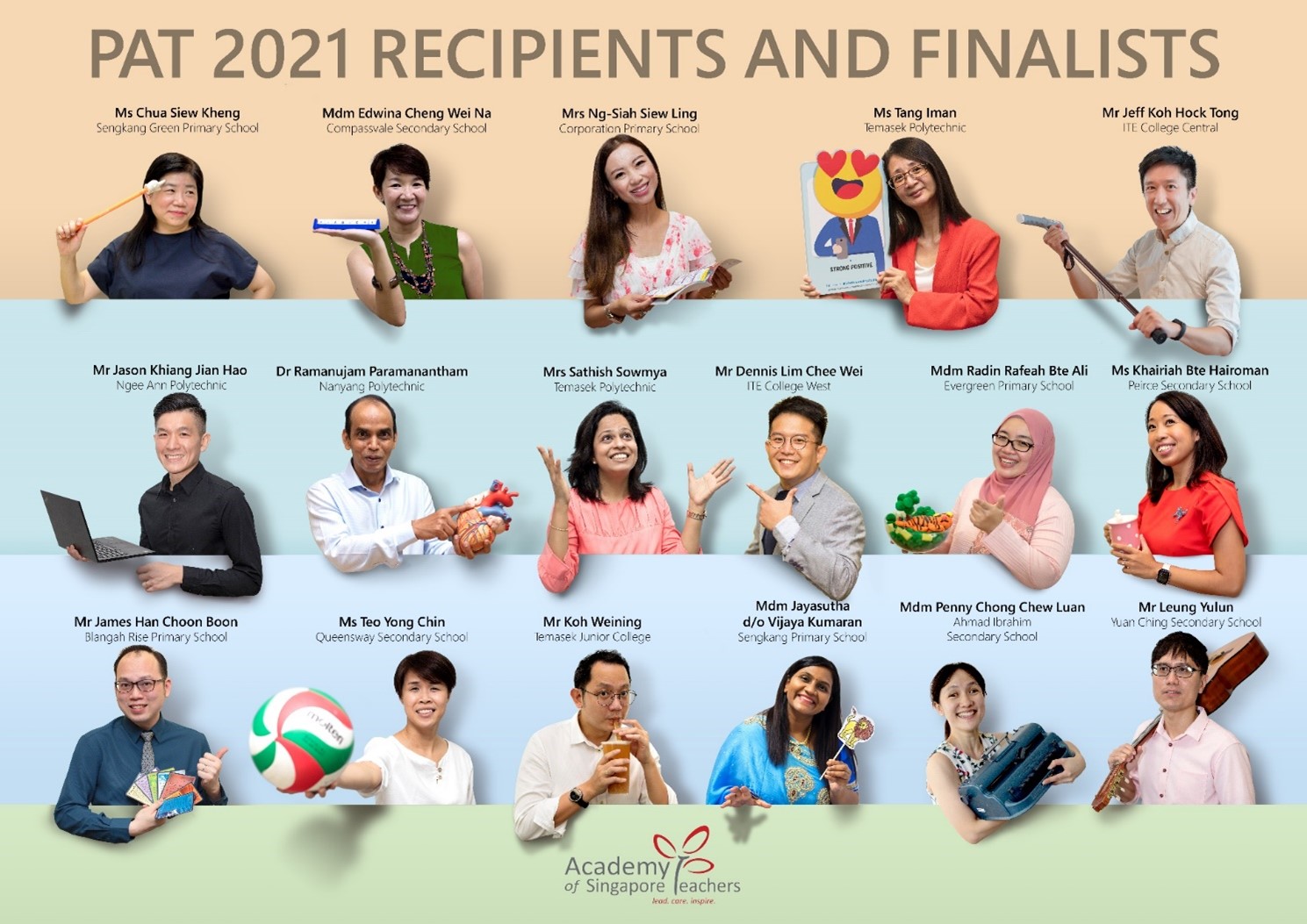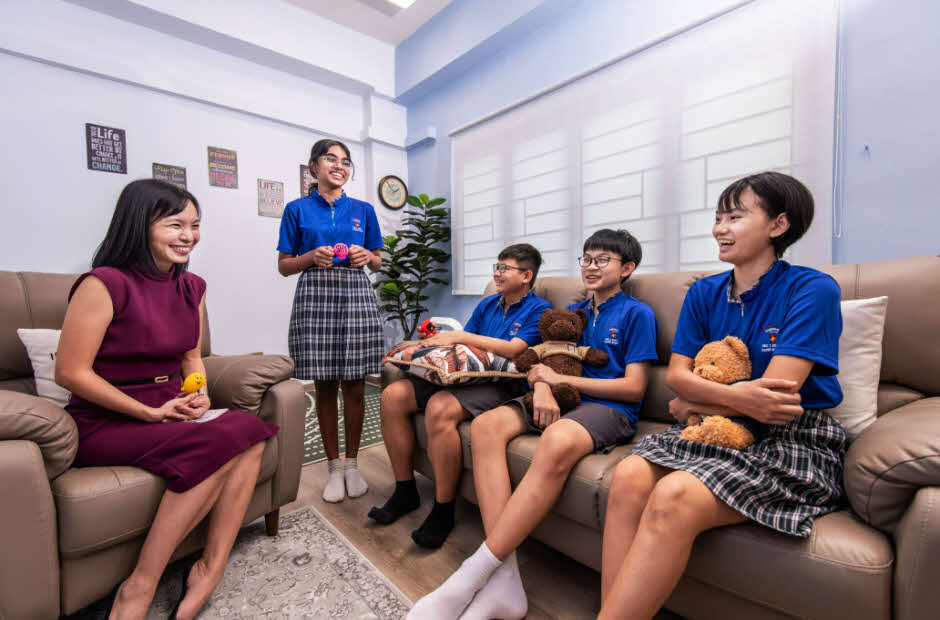Dennis Lim Chee Wei, Institute of Technical Education, President’s Award for Teachers 2021 Finalist
It’s past midnight and you have a burning question about a topic learnt in school. What should you do? Tell it to AskCher.
Introduced in 2019, AskCher is an online chatbot ideated and co-developed by Dennis Lim, ITE Lecturer-Mentor of Service Management at the Institute of Technical Education (ITE) College West. It is currently available to his Higher Nitec students via the school’s learning portal, but there are plans to encourage wider adoption across the campus.
Students can easily access this chatbot platform via their mobile phones or laptops. AskCher is trained to answer queries for specific modules. This helps to reduce barriers for students to seek help —seeking and empowering them to take ownership of their own learning, says Dennis.
He explained, “In a class of 40, we have students with different personalities. Some are quiet and shy, so when they have doubts, they hesitate to ask questions in class. Students also prefer to message the teachers privately to clarify their doubts.
“I decided to develop the AskCher chatbot, so that students can ask questions as and when they want. Of course, if they have follow-up questions or wish to seek clarifications, they know they can still approach us.”
Since the launch of AskCher, Dennis and his colleagues observed that the students have an improved understanding of the basic module content, which has freed up lecturers to tackle more complex queries and issues. Dennis estimates that the chatbot saves his colleagues and him some 10,000 man-hours annually.
24/7 access… and cost savings too
AskCher is just one of many initiatives that Dennis has mooted over the years, many of them aimed at helping students from disadvantaged backgrounds.
This sensitivity towards this particular group of students could be attributed to Dennis’ younger days. As an active volunteer with the Chinese Development Assistance Council in his 20s, he interacted frequently with youths from low-income families. The stint proved to be a life-changing experience as it prompted Dennis to leave the comfort of his engineering career and become a teacher.
When he joined ITE College West in 2014, one of the first things he did was to kickstart a digitalisation drive. He converted the bulk of his teaching notes and materials into a digital format, so that his students could save money on printouts and buying textbooks.
He shared, “Students who come from financially challenged backgrounds receive financial support from the school. But some need to contribute to their families and may not have enough money for meals and other necessities.
“It’s also not environmentally-friendly to be constantly printing hard copies of textbooks. Besides the cost savings, students also appreciate that they can access their course materials digitally anytime, anywhere.”
It also helped that ITE already had various financial and non-financial assistance schemes in place to ensure that every student had access to a computer or laptop. This facilitated the students’ transition to digital materials.
Catering to different learning styles
Observing that his students learn better when information is presented to them in bursts, Dennis champions the concept of micro-learning and converts his modules into step-by-step guides with key pointers.
He also turned to YouTube to learn how to design simple infographics, so that he could additionally summarise these pointers as graphics for students who were visual learners. A fringe benefit? Such materials could be shared easily via mobile phones and laptops.
The success of the micro-learning approach – the students showed better retention of information – inspired Dennis to create Revision Buddy, an award-winning chatbot platform that allows students to revisit lecture notes and check definitions based on a keyword search.
“The driving force behind Revision Buddy is to recognise the different learning styles and capabilities of our students. Not only does this chatbot allow students to learn by reading, it also allows them to learn by listening,” Dennis shared. “Some of our dyslexic students face difficulty reading long text paragraphs. Revision Buddy’s text-to-voice function allows them to listen to the content instead.”
If you look at Dennis’ teaching materials, you will also see that he always uses the Verdana font. Why is that so?
Dennis had signed up for a course to better support students with special education needs. There, he learnt that dyslexic students generally face language difficulties and are prone to committing spelling and typing errors, and that the Verdana font helps them to read better. He not only uses that font across platforms, it is a tip that he readily shares with others in the teaching fraternity and with industry attachment (IA) partners.
Creating opportunities for meaningful internships
Besides the digitalisation drive, Dennis aims to make a difference in his students’ lives by securing internship opportunities for them. Under his charge, the number of internship partners for the Higher Nitec in Service Management course jumped seven-fold within five years.
To achieve this, he tapped into his personal network, attended numerous networking events and spent hours convincing companies to give his students an opportunity through face-to-face meetings. Today, his students have the option of taking up internships with companies across a wide variety of sectors, such as finance, healthcare, retail, tourism and hospitality.
“I always encourage our partners to interview the students and let them take on positions with a wider job scope, instead of limiting them to only entry-level jobs. This is so that our students can have more career progression opportunities and in turn, command a higher salary later on,” Dennis said.
Constant quest to address pain points
Often described by his students as “energetic and enthusiastic”, Dennis is currently working on a few initiatives to help students learn with greater ease.
This includes a proposal for Virtual Reality (VR) internships amid pandemic-related uncertainties, such as temporary closures of shopping malls for disinfection and cleaning. Dennis hopes that by simulating a retail environment for students through VR, they can still learn about the key customer touchpoints in the absence of a physical experience.
He is also planning to further the micro-learning approach for continuing education and training modules for adult learners, and make them available online.
And if you are wondering — another chatbot platform is in the works.
As a result of the success of AskCher, the school management has tasked Dennis to support the development of another chatbot. The new chatbot would help students rehearse common job interview questions and have their responses recorded for feedback and development.
Dennis said, “I’m always trying to identify and address pain points on the ground, not just for the students, but also the teachers. I hope that by constantly innovating and leading by example, I can inspire my students to do the same for others.”





.jpg)

.jpg)